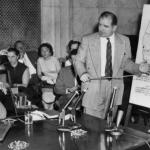On Trump, McCarthyism, and the Russia Hacking Charges
https://portside.org/2017-04-13/trump-mccarthyism-and-russia-hacking-charges

Portside Date:
Author: Victor Navasky
Date of source:
The Nation

So Peter Beinart in The Atlantic writes an article on “The New McCarthyism of Donald Trump.” Simon Jenkins in The Guardian informs us that “Donald Trump on terror is just McCarthyism for a new age.” Jonathan Chait in New York magazine argues forcefully that “Donald Trump Is the Perpetrator of McCarthyism, Not the Victim of It,” and Trump himself famously tweets, “Terrible! I just found out that Obama had my ‘wires tapped’ in Trump Tower just before the victory. Nothing found. This is McCarthyism!” Even the Russians chime in, with Foreign Minister Sergey Lavrov observing that the uproar over Jeff Sessions “strongly resembles a witch hunt or the times of McCarthyism, which we thought were long over in the United States as a civilized country.”
The charges of McCarthyism are important because (a) McCarthyism indeed had such a profound impact on our country, our culture, and beyond; and (b) because some of its consequences may still be with us.
Trump, like McCarthy, makes irresponsible, careless charges against opponents.
So what is/was McCarthyism? Joseph McCarthy came to national attention with his Lincoln Day speech to the Republican Women’s Club of Wheeling, West Virginia, on February 9, 1950, when he famously said, “I have here in my hand a list of 205—a list of names that were made known to the secretary of state as being members of the Communist Party and who nevertheless are still working and shaping policy in the State Department.” But, of course, McCarthyism (and the Red Scare) was in force before McCarthy himself came on the scene to lend it his name; during its heyday, it encompassed J. Edgar Hoover’s omnipresent FBI (which seemed to see, as the saying went, a Red under every bed); the House Committee on Un-American Activities, or HUAC (whose infamous hearings led to the Hollywood blacklist, among other antidemocratic practices); the Senate Internal Security Subcommittee; the attorney general’s list of subversive organizations; the Subversive Activities Control Board; and the mini-HUACs and police Red squads in states and cities across the country, not to mention private-sector blacklisters like “Red Channels” and much more. Methodologically, McCarthyism involved irresponsible and careless charges of communist affiliation; substantively, it imported the assumption that to be a Red was to be a subversive (and, of course, to be a liberal was to be a socialist was to be a Red), all of which helped create and escalate the anticommunist hysteria.
How does McCarthyism apply to the present situation in general and to Trump and Trumpism in particular? Exhibit A of irresponsible and careless charges (though obviously, in this case, not of being a communist): Trump’s allegation that Obama wiretapped him. The larger question of how McCarthyism applies to the present situation is complicated by the charges that Russia hacked the Democratic National Committee and perhaps the entire American electoral process. My own view is that we won’t know what the Russians did or didn’t do until a special prosecutor (or some other impartial mechanism) is put in place to investigate the matter, but that the readiness of much of the American press and establishment to assume that the worst charges against Russia (including collaboration with and by Trump) are true is, given the lack of specific evidence, at least in part a legacy of Cold War attitudes toward the Soviet Union.
One lesson to be learned about McCarthyism has to do with the role that much of the liberal community played in it. I include here some of our staunchest liberal humanists and organizations, like the historian Arthur Schlesinger Jr., New York Post editor James Wechsler, Senator Hubert Humphrey, Americans for Democratic Action, and even the American Civil Liberties Union, all of which were infected, I would argue, by the hysteria over the Red Menace. (There were, of course, noble exceptions: a small band of left-liberals like Yale Law School’s Tom Emerson, Princeton’s H.H. Wilson, the law firm of Rabinowitz and Boudin, and, not least, The Nation’s former editor Carey McWilliams, among others.)
To cite one example, Schlesinger advocated that the government should name the Communist Party “as a criminal conspiracy” and that all who were associated with it be subjected to prosecution as co-conspirators. As for those he considered “fellow travelers,” like Emerson, he conceded that they were not communists but said, “They are the Typhoid Marys of the Left, bearing the germs of infection even if not suffering obviously from the disease.”
One of the legacies of the McCarthy era is the cloud of suspicion that still hangs over anything and anyone connected with the former Soviet Union. Former KGB agent Vladimir Putin is undoubtedly guilty of ruthlessness, repression, and much else, but he is not Stalin; and especially given the paucity of specific direct evidence, I would suggest that those (including liberals, in and beyond the media) who too easily assume that Trumpites who talked to the Russians (even those who then falsely denied it) are guilty of colluding or collaborating with them may be victims of the same sort of irrational forces that tainted too many Cold War liberals.
If Trump or his associates were indeed guilty of collaborating with the Russians by interfering in the American election, then they broke the law and should be held accountable. But in a world threatened by nuclear weapons, ISIS, and climate change, it seems to me more important than ever that we talk to our adversaries (especially Putin) and work toward détente.
[Victor Navasky has served as editor, publisher and now publisher emeritus of The Nation. He teaches at the Columbia University's Graduate School of Journalism, where he chairs the Columbia Journalism Review.]
Copyright c 2017 The Nation. Reprinted with permission. May not be reprinted without permission. Distributed by PARS International Corp.
Please support our journalism. Get a digital subscription to The Nation for just $9.50!
